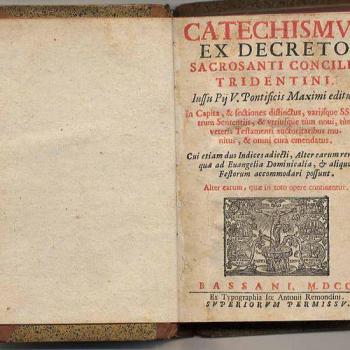Fr. Chad Ripperger’s name is one that seems to be popping up frequently in Catholic circles these days. His YouTube videos are used to defend a number of claims, such as the alleged occult nature of the Harry Potter books — a claim I’ve previously debunked.
More recently, he has claimed that working mothers are committing mortal sin by working outside the home unless they have sufficient and/or grave reasons to do so.
Not surprisingly, I have several problems with this statement (and I really want to send him a copy of my book).
Mortal Sin vs. Grave Sin
First off, it baffles me that a Catholic priest who has several advanced degrees in theology and philosophy, including a Ph.D., seemingly doesn’t know the difference between mortal sin and grave sin. I’m a laywoman with a single bachelor’s degree and I know this. Why doesn’t he draw a distinction?
As I said in my article about that topic: a sin can only be mortal sin if all three conditions have been met: grave matter, full knowledge, and complete consent. If any of these elements are lacking, the sin cannot be mortal.
Unless Fr. Ripperger knows for a fact that every single Catholic working mother in existence fulfills all of the criteria for mortal sin, he cannot say with certainty that women working outside the home is a mortal sin. He can opine that it is a grave sin, and he can opine that many working mothers may be in mortal sin, but he is de facto wrong to say that all Catholic working mothers everywhere are committing mortal sin by working.
Where’s His Proof from Church Teaching?
Based on my research, Fr. Ripperger has made this claim a few times. In this YouTube video, titled “Feminism and the Natural Order,” he states: “…it is a mortal sin for a woman to work outside the home without a sufficient reason” (18:08-13).
He doubles down on this claim in an interview with Ryan Grant on the Aude Sapere podcast, also posted on YouTube here. The latter is what I listened to in order to hear his remarks in context. Near the start, Grant references a conference that Ripperger spoke at and quotes Ripperger as saying at that conference, “…it’s a mortal sin for women to work outside the home without a grave reason” (1:57).
Grant continues,
Now a lot of people are treating this as something that is just your opinion, or that you just made up out of thin air, or somehow contrary to church teaching; I’ve seen that in a lot of circles. What’s the history of the church is teaching on this subject, what are the sources for the — in the tradition for the statement you made in that conference?
I was very glad he asked that question, because I was quite keen to know the answer.
First, however, I was treated to a long, rambling tangent about the nature of the marital debt, which Fr. Ripperger said was background information. To summarize this tangent, Fr. Ripperger believes that marriage between two people is a contract based in natural law wherein both parties pledge to give one another “bed and board,” with bed being the marital debt, and a woman somehow violates the board portion of this contract by working outside the home.
When I first Googled this phrase, I found a lot of references to civil divorce laws. More refined searching led me to the New Advent article about Christian divorce. In a nutshell, “separation of bed and board” refers to “a separation of married parties leaving the marriage bond intact.”
Further searching led me to this article, Rarely Discussed Morals in Marriage, written in 1956 by a Rev. Garrett F. Barry. Ripperger’s views on women working outside the home seem to be quite similar to Barry’s. However, Fr. Barry doesn’t go so far as to state that women who work outside the home are in a state of mortal sin.
Fr. Barry does say,
The Code of Canon Law (Canon 1128) affirms that husband and wife are obliged to observe community or conjugal life unless a just reason excuses them. This obligation includes normally the habitual sharing of bed, board and home.
Fr. Ripperger’s thesis, then, seems to be that when a woman works outside the home, she is not engaging in the sharing of “bed and board” and thus violates this natural law marriage contract.
I’m at a loss as to how he comes to this conclusion. For example, when I worked outside the home, my income literally paid our mortgage, so I was definitely contributing to the board part of the equation — and I even graciously allowed my husband to live in the home with me and my children.
Now, other than this natural law thesis, Fr. Ripperger does not cite any other Church teaching in defense of his claim. He cites a book on moral theology (one also cited by Fr. Barry) called Manuale Theologiae Moralis, by D. M. Prummer, published in 1945 or 46. He makes a vague reference at the beginning of his spiel about “a number of moralists before the council that actually talked about the obligations of women” (2:39). But otherwise… nothing. No canon law, no catechism, no papal writings, nada.
At 9:25, Ryan Grant asks Fr. Ripperger if there are any “newer” teachings — i.e., post-Vatican-II teachings — to back up his claim. Fr. Ripperger cites Popes Francis and Benedict XVI as saying that a child has a right to be raised by his parents. He cites no other evidence.
The Crux of the Problem
That brings us to the underlying problem with Fr. Ripperger’s claims. He says at 8:31-9:20:
I think the difficulty that’s happened, especially after the advent of contraception, is that people think that the writ — that raising a child — that the child is really there for my own satisfaction, or that my obligations to the child is, ‘well he’s getting his food, he’s getting taken care of, I’ll spend “quality time with him” at night, which is absurd, because of the fact that — you know it’s one thing if a woman has to work outside of home because of grave cause; it’s another matter if she is doing it because she wants a career or just because they want a standard of living which they don’t really need that they couldn’t survive off the husband’s income or what-have-you, so it’s the grave obligation to the moral formation and psychological formation the child which is the foundation for why the moralists say, if she works outside the home without a sufficient reason then it’s grave cause.” [Note: I think he means “grave sin” here, not grave cause.]
Apparently, working moms without grave cause to work don’t actually raise their children.
There are several problems with this statement.
He says it’s one thing if a woman has to work outside of the home because of grave cause, but “another matter” if she’s working for reasons that Fr. Ripperger deems unsuitable. Now, bear in mind that by Fr. Ripperger’s measure, Gianna Beretta Molla — a canonized saint in the Catholic Church — was a flagrant, unrepentant sinner for most of her married life and up until the day she died. St. Gianna worked not because of “grave cause” — i.e., financial necessity — but because she “wanted a career.” She wanted a career as a pediatrician because she genuinely and sincerely believed God was calling her to work as a doctor, even after she married and had children.
But let’s say we have a woman who is working outside the home because of a grave cause, and another who is working outside the home because she “wants a career.” Apparently the children of the former woman are being raised by her while the the children of the latter women are not, even if both women send their children to the same daycare and spend the same amount of time at home with their children. Does Fr. Ripperger believe that a woman’s interior motivations alone are what constitutes raising or not raising children?
What about the single mom who has to work two jobs just to make ends meet vs. the married, successful career mom who is able to work a 9-to-5 job and be home with her children every night and every weekend? How is it that the single mom is raising her children despite less time with them, but the married career mom is not despite more time with them?
And where is the father in all of this? If it is quantity of time spent with children that constitutes raising them, then by Fr. Ripperger’s logic, fathers do not raise their own children. They are absent from the home all day. If a father is forced to work two or even three jobs in order to allow his wife to stay at home, as Fr. Ripperger dictates she should, he barely sees his children at all. So what is he other than a means to conceive children and a means to pay for their upkeep?
Does Fr. Ripperger really believe that fathers should be reduced to nothing but a penis and a paycheck?
Parents Raise Their Children
As I’ve written before, daycares do not raise children. Parents work together to raise children, and if they both are employed outside the home, they hire trusted individuals to care for their children’s basic needs during the day. Working for a living does not and has never precluded raising one’s children, as history shows all too well.
On Daniel Stewart’s (husband of Haley Stewart of Carrots for Michaelmas) now-defunct blog, he wrote an excellent article about the “Cult of Domesticity” (you can read it courtesy of the Internet Wayback Machine). It’s a succinct and accurate history of when economic activity started taking place outside the home instead of in the home. As he demonstrates, the 1950s paradigm of the stay-at-home-mother and working-outside-the-home father is a historical anomaly and one that usually only applied to upper-middle-class Caucasian couples.
The Catholic Church does not now and has never taught that it is a “mortal sin” for mothers to work outside the home. She has consistently taught that sin MAY enter the equation if either parent — mother or father — needlessly neglects home and family due to the demands of their career.
The Church speaks about the importance of fathers in the home, raising children alongside their mother, and does not reduce men to a source of sperm and spending money, nor does She say that mothers cannot raise their children properly if they work outside the home.
Contrary to his claims, Fr. Ripperger’s opinion is just that — his opinion. Moreover, it is an opinion that is not based on the historical teachings of the Catholic Church, but rather on the similar opinions of fallible moral theologians whose writings are not Magisterial in nature.
Featured image by Gerd Altmann from Pixabay












